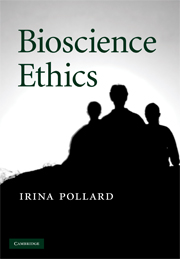Book contents
- Frontmatter
- Contents
- Preface
- Acknowledgements
- 1 Human origins, natural selection and the evolution of ethics
- 2 Sex determination, brain sex and sexual behaviour
- 3 Inappropriate lifestyle and congenital disability in children: basic principles of growth, toxicology, teratogenesis and mutagenesis
- 4 Substance abuse and parenthood: biological mechanisms – bioethical responsibilities
- 5 Fertility awareness: the ovulatory method of birth control, ageing gametes and congenital malformation in children
- 6 Understanding child abuse and its biological consequences
- 7 The state of wellbeing: basic principles, coping strategies and individual mastery
- 8 The state of wellbeing: on the end-of-life care and euthanasia
- 9 Current reproductive technologies: achievements and desired goals
- 10 The recombinant DNA technologies
- 11 Stem cells, nuclear transfer and cloning technology
- 12 Human-dominated ecosystems: re-evaluating environmental priorities
- 13 Human-dominated ecosystems: reclaiming the future for following generations
- 14 Human-dominated ecosystems: warfare = fitness enhancement or losing strategy?
- 15 Human-dominated ecosystems: reworking bioethical frontiers
- Further reading
- Index
4 - Substance abuse and parenthood: biological mechanisms – bioethical responsibilities
Published online by Cambridge University Press: 17 February 2010
- Frontmatter
- Contents
- Preface
- Acknowledgements
- 1 Human origins, natural selection and the evolution of ethics
- 2 Sex determination, brain sex and sexual behaviour
- 3 Inappropriate lifestyle and congenital disability in children: basic principles of growth, toxicology, teratogenesis and mutagenesis
- 4 Substance abuse and parenthood: biological mechanisms – bioethical responsibilities
- 5 Fertility awareness: the ovulatory method of birth control, ageing gametes and congenital malformation in children
- 6 Understanding child abuse and its biological consequences
- 7 The state of wellbeing: basic principles, coping strategies and individual mastery
- 8 The state of wellbeing: on the end-of-life care and euthanasia
- 9 Current reproductive technologies: achievements and desired goals
- 10 The recombinant DNA technologies
- 11 Stem cells, nuclear transfer and cloning technology
- 12 Human-dominated ecosystems: re-evaluating environmental priorities
- 13 Human-dominated ecosystems: reclaiming the future for following generations
- 14 Human-dominated ecosystems: warfare = fitness enhancement or losing strategy?
- 15 Human-dominated ecosystems: reworking bioethical frontiers
- Further reading
- Index
Summary
My starting point is the intuition that caring is ethically important. Caring expresses ethically significant ways in which we matter to each other, transforming interpersonal relatedness into something beyond ontological necessity or brute survival.
Prepregnancy care is the physical and behavioural preparation for childbearing by both parents well before conception. This and the next chapter integrate biological mechanisms initiated by social events, such as stressful life episodes, drug abuse or inappropriate sexual behaviour, resulting in the generation of serious congenital abnormalities in the offspring. The importance of increased biological understanding and bioethical awareness in reducing haphazard pregnancies is emphasized – when reproduction is considered a privilege, not a right, the chance of a good outcome is significantly elevated.
Introductory background
The aetiology of abnormal development is a combination of genetic and epigenetic factors, as well as a large category labelled unknown. A significant proportion of congenital malformations of unknown aetiology are polygenic or multifactorial in origin. The term ‘multifactorial causation’ is used when the combination of environmental insult(s) and a particularly susceptible genome in the conceptus is required for adverse effects to be apparent. Research identifying functional interactions between specific gene polymorphisms that contribute to genetic vulnerabilities is recent and falls within the new field of ecogenetics. Malformations with an increased recurrent risk such as cleft lip/palate, anencephaly (congenital absence of major portions of the brain), spina bifida, congenital heart disease, pyloric stenosis and congenital dislocation of the hip, fit the criteria for polygenic inherited or multifactorial diseases. Ecogenetics reinforces the urgent need to upgrade more vigorously social, economic and political responsibilities.
- Type
- Chapter
- Information
- Bioscience Ethics , pp. 61 - 89Publisher: Cambridge University PressPrint publication year: 2009



